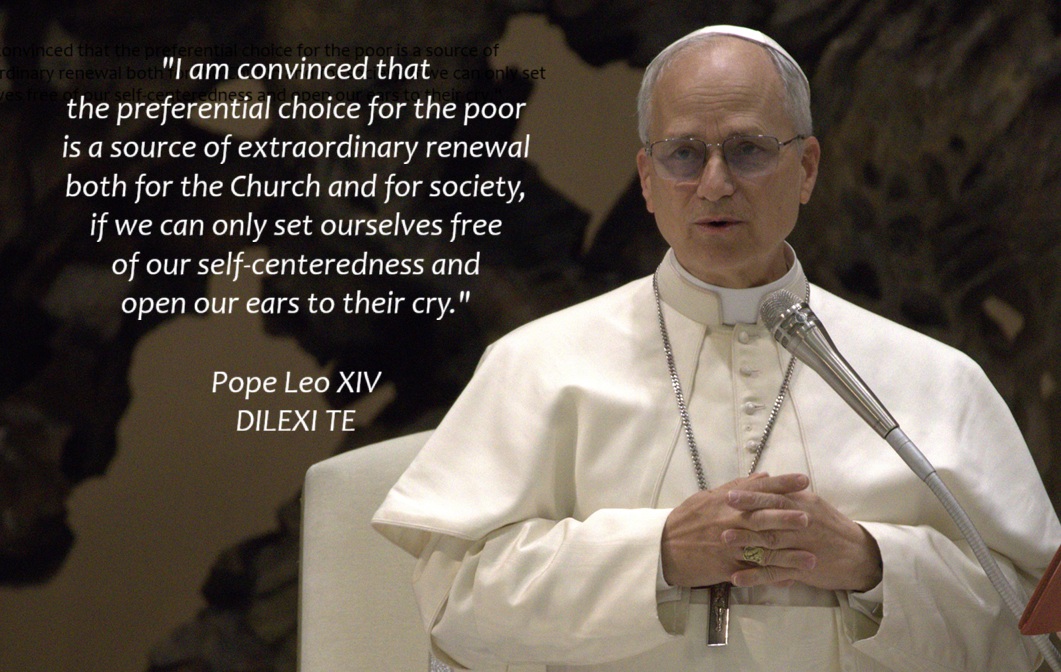Five Takeaways of Dilexi Te
Pope Leo’s first new teaching was released today, October 9, 2025. In it, our new pope pushes us to put our faith into action and leaves us with urgent questions to answer.
The apostolic exhortation “Dilexi Te” (He Loved You), was a project started by Pope Francis and focuses on the inseparable link between Christian faith and care for the poor. This sort of papal teaching is meant to provide clear direction for Catholics on an important issue being discussed within the Church.
Here are some of the most powerful quotes from the five-chapter, 40-page teaching:
On Christ’s Love and Encountering God
Pope Leo asserts that serving the poor is a direct encounter with Jesus:
“Love for the Lord, then, is one with love for the poor… contact with those who are lowly and powerless is a fundamental way of encountering the Lord of history. In the poor, he continues to speak to us.” (Paragraph 5)
On the Church’s Mission and Renewal
Pope Leo echoes the desire of his predecessor, Pope Francis, regarding the nature of the Church:
“Three days after his election, my predecessor expressed to the representatives of the media his desire that care and attention for the poor be more clearly present in the Church: ‘How I would like a Church which is poor and for the poor!'” (Paragraph 35)
The commitment to the poor is presented as a necessary path to renewal:
“I am convinced that the preferential choice for the poor is a source of extraordinary renewal both for the Church and for society, if we can only set ourselves free of our self-centeredness and open our ears to their cry.” (Paragraph 7)
On Justice and Challenging World Systems
Pope Leo characterizes poverty not just as an unfortunate reality but as a moral challenge to global structures:
“The condition of the poor is a cry that, throughout human history, constantly challenges our lives, societies, political and economic systems, and, not least, the Church.” (Paragraph 9)
He also critiques the idea that poverty is deserved:
“The poor are not there by chance or by blind and cruel fate. Nor, for most of them, is poverty a choice. Yet, there are those who still presume to make this claim, thus revealing their own blindness and cruelty… Nor can it be said that most of the poor are such because they do not ‘deserve’ otherwise, as maintained by that specious view of meritocracy that sees only the successful as ‘deserving.'” (Paragraph 14)
On the True Treasures of the Church
Recounting the story of Saint Lawrence, Pope Leo defines the Church’s true wealth:
“Questioned about where the promised treasures might be, he pointed to the poor saying, ‘These are the treasures of the Church.'” (Paragraph 38)
He quotes Saint John Chrysostom to forcefully prioritize care for the needy over lavish worship:
“What advantage does Christ gain if the sacrificial table is laden with golden vessels, while he himself dies of hunger in the person of the poor? Feed the hungry first, and only afterward adorn the altar with what remains.” (Paragraph 41)
On Recent Church Teachings and Signs of the Times
Pope Leo describes the Second Vatican Council as “a milestone in the Church’s understanding” of its relationship with the poor, which Pope Saint John XXIII famously said at the time is to be “the Church of all and in particular the Church of the poor.”
“There was a growing sense of the need for a new image of Church, one simpler and more sober, embracing the entire people of God and its presence in history. A Church more closely resembling her Lord than worldly powers and working to foster a concrete commitment on the part of all humanity to solving the immense problem of poverty in the world.” (Paragraph 84)
Pope Leo also looks to the experience of the Church in Latin America in recent years as a source of understanding about the Church’s relationship with the poor.
First, he names the martyrdom of Saint Oscar Romero in El Salvador in 1980 as a posture the Church should adopt. “He made his own the plight of the vast majority of his flock and made them the center of his pastoral vision.” (Paragraph 89)
Second, having served as a missionary in Peru, Pope Leo names the Conference of the Latin American Bishops held in Medellín, Colombia, in 1968 as a significant source of understanding of the Church’s role in fighting structures of sin that create poverty and inequality:
“The bishops stated forcefully that the Church, to be fully faithful to her vocation, must not only share the condition of the poor, but also stand at their side and work actively for their integral development.” (Paragraph 90)
“We need to be increasingly committed to resolving the structural causes of poverty. … I can only state once more that inequality ‘is the root of social ills.’” (Paragraph 94)
Quoting Pope Francis, Pope Leo criticizes the current global economic model for its favoritism of the self-reliant and lack of “investment in efforts to help the slow, the weak or the less talented to find opportunities in life.”
He leaves us with questions we as the Church need to answer:
“The same questions keep coming back to us. Does this mean that the less gifted are not human beings? Or that the weak do not have the same dignity as ourselves? Are those born with fewer opportunities of lesser value as human beings? Should they limit themselves merely to surviving? The worth of our societies, and our own future, depends on the answers we give to these questions. Either we regain our moral and spiritual dignity or we fall into a cesspool.” (Paragraph 95)

